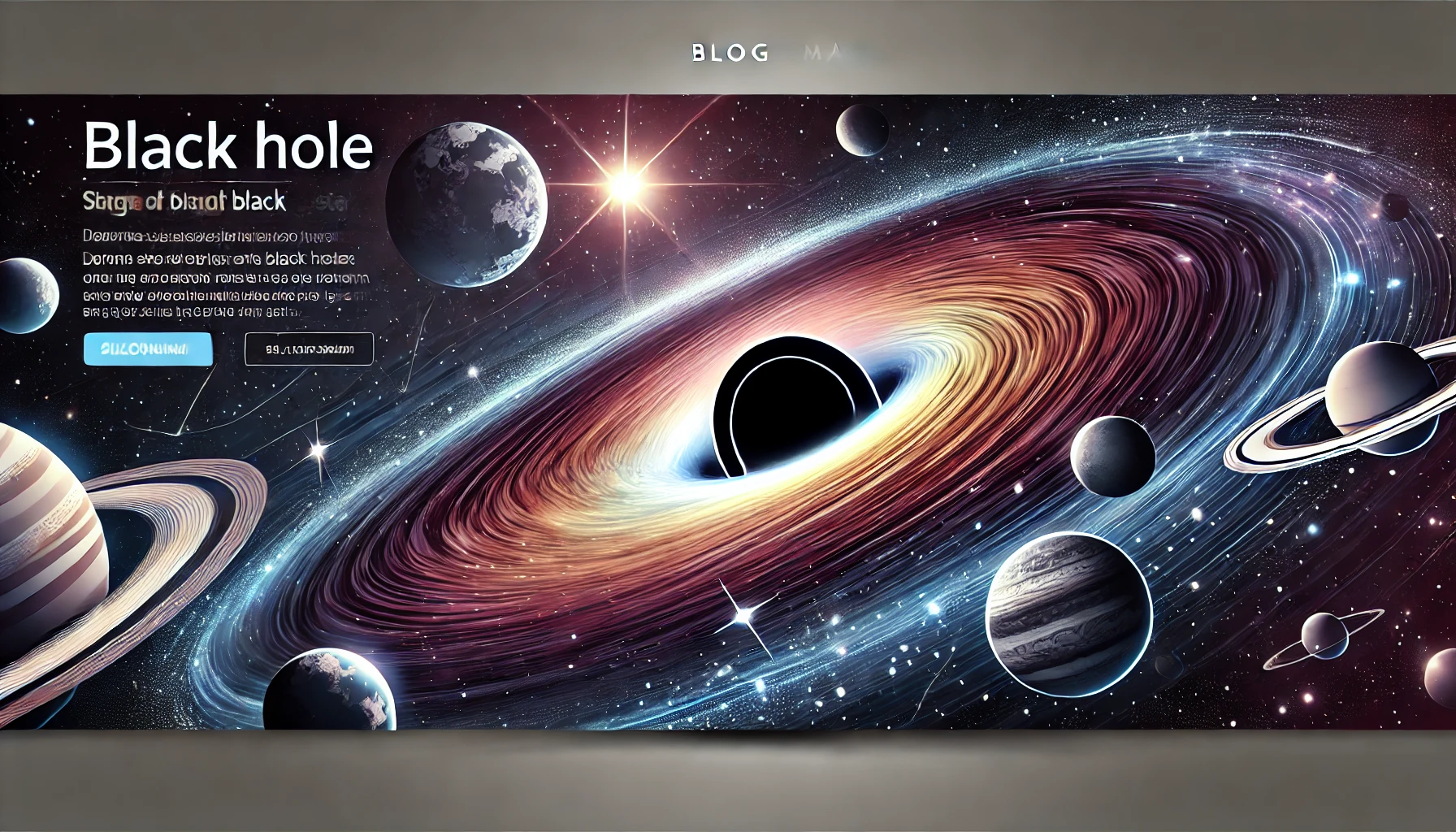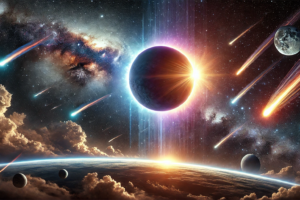What Happens When a Primordial Black Hole Passes Through Our Solar System?
The mysteries of black holes have fascinated scientists and the public alike for decades. But while much of the attention has focused on supermassive black holes and their effects on galaxies, a lesser-known but equally intriguing type of black hole may be lurking in our own neighborhood: primordial black holes. These tiny, ancient remnants from the early universe could be zooming through our solar system every decade without us even knowing. But what exactly are these primordial black holes, and how could their presence impact our solar system?
In this blog, we’ll explore the formation of primordial black holes, the possibility of them passing through our solar system, their connection to dark matter, and what scientists are doing to detect these elusive objects.
What Are Primordial Black Holes?
Unlike black holes that form from the collapse of massive stars, primordial black holes are believed to have formed shortly after the Big Bang. During the universe’s early expansion, fluctuations in density could have created regions of extremely dense matter, which then collapsed into black holes. These black holes didn’t need stars to form—they emerged from the very building blocks of the universe.
Primordial Black Hole Formation and Characteristics
Primordial black holes vary greatly in size, ranging from as small as an asteroid to several times the mass of our sun. Because they formed so early, these black holes might still be scattered throughout the universe. One of the most intriguing aspects of primordial black hole formation is that it could provide insights into the structure and evolution of the universe itself(Earth.com).
Scientists speculate that primordial black holes could be responsible for a range of cosmic phenomena, including the distribution of galaxies and the existence of dark matter. In fact, some researchers believe that tiny black holes in the solar system could even account for the elusive dark matter that makes up about 85% of the universe’s mass(Earth.com).
Primordial Black Holes in Our Solar System: Could They Be Passing Through?
Recent research suggests that primordial black holes may pass through our solar system every decade or so. These black holes, some as small as an asteroid, may zoom by unnoticed due to their small size and lack of interaction with visible light. However, they could still exert a gravitational influence on objects they pass close to.
Primordial Black Hole Flybys: How Do They Affect the Solar System?
A black hole flyby could have various consequences depending on the size and proximity of the black hole. While smaller asteroid-mass black holes may not significantly affect planets or the sun, larger ones could distort orbits, shift asteroids, and potentially disrupt the trajectories of objects in the outer solar system(Earth.com)(Space.com).
That said, the chances of a primordial black hole passing close enough to Earth to cause direct damage are extremely low. Even though these black holes could pass through our solar system, they are most likely to stay in the outer reaches, far from the planets. Still, their presence could leave subtle signatures in the gravitational fields around us, offering scientists a chance to detect them.
The Connection Between Primordial Black Holes and Dark Matter
One of the most intriguing theories about primordial black holes is their potential role as dark matter. Dark matter black holes could make up a significant portion of the universe’s missing mass. These tiny black holes, which are almost impossible to detect directly, could be the “invisible” substance responsible for the extra gravitational pull observed in galaxies and clusters(Earth.com).
Could Primordial Black Holes Be the Key to Dark Matter?
Although dark matter remains one of the biggest mysteries in cosmology, primordial black holes are a promising candidate for its composition. By studying the potential gravitational effects of these black holes, scientists hope to gather more data about dark matter and how it shapes the universe(Earth.com).
Several experiments, such as those observing gravitational lensing (the bending of light around a massive object), have been set up to detect the presence of primordial black holes. These experiments are crucial because primordial black holes dark matter would not emit or reflect light, making them difficult to observe directly(Space.com).
Primordial Black Holes and Gravitational Waves
Another way to detect primordial black holes passing through our solar system is through gravitational waves. When black holes merge, they create ripples in the fabric of space-time that can be detected by instruments like LIGO and Virgo. Scientists are studying the possibility that small primordial black hole flybys could produce detectable gravitational waves(Space.com).
While detecting these waves is a major technical challenge, the rewards would be groundbreaking. If scientists can confirm the existence of primordial black holes through gravitational waves, it would provide direct evidence of these ancient objects, which have remained elusive for decades.
The Future of Primordial Black Hole Research
As technology advances, scientists are getting closer to confirming the existence of primordial black holes and understanding their role in the cosmos. New methods of detecting tiny black holes in the solar system, such as using gravitational wave detectors and studying gravitational lensing, are paving the way for exciting discoveries(Earth.com).
Primordial Black Hole Impact on the Solar System
While the idea of a black hole in our solar system sounds alarming, most scientists agree that the actual risk posed by primordial black holes is minimal. These black holes are far too small to cause widespread destruction, and their impact would likely be limited to subtle gravitational effects.
However, their potential role in dark matter and the structure of the universe makes them a fascinating subject of study. If we can confirm the existence of these primordial black holes, it could transform our understanding of the universe and help answer some of the biggest questions in cosmology.
The Search for Primordial Black Holes
The concept of primordial black holes zooming through our solar system may sound like science fiction, but it is rooted in serious scientific inquiry. These tiny remnants of the early universe could hold the key to understanding dark matter and the formation of galaxies. As scientists continue their search, we may one day detect a primordial black hole flyby, offering a glimpse into the mysterious forces that shape our universe.
The more we learn about primordial black holes, the more we realize how much remains to be discovered about the universe’s most mysterious objects. Whether through gravitational waves, dark matter research, or direct detection, the future of black hole science promises to be as fascinating as it is revolutionary.
For more fascinating insights into space and the universe, visit Regent Studies, where we explore the wonders of science and cosmology.
For additional information on the science of primordial black holes and their potential to solve the dark matter mystery, check out this article on Earth.com.




